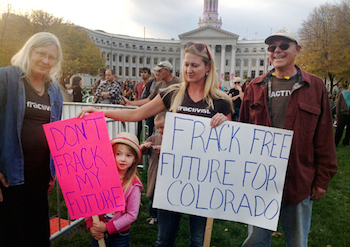On Colorado: Waiting and Seeing

You can’t say that the politics of oil and gas in Colorado have been dull lately.
Last week, on the day that signatures for four statewide oil and gas ballot initiatives were due, Governor Hickenlooper announced with Representative Polis that the four initiatives would be withdrawn as part of a political deal.
Two of those initiatives, which had garnered hundreds of thousands of voters’ signatures in support, were dedicated to reprioritizing Colorado’s oversight of oil and gas development so that the public’s interests -- including affected communities -- would clearly come ahead of private industry’s.
The rest of the deal involved the Governor dropping the state’s lawsuit against the city of Longmont’s oil and gas ordinance and setting up a “Blue Ribbon” Commission to make recommendations to the legislature for how to address the issues of the appropriate framework for oil and gas regulation in the state.
We now await the naming of that 18 member commission, whose only sure members are co-chairs XTO Energy President, Randy Cleveland, who is based in Texas, and La Plata County commissioner, Gwen Lachelt – my predecessor as the director of Earthworks’ Oil & Gas Accountability Project. The rest of the members could be named as early as this week.
So what can we expect from this commission process?
This is not the first time that the governor has turned to a stakeholder group to try to address difficult oil and gas issues. In 2012, he set up the Task Force on Cooperative Strategies Regarding State and Local Regulation of Oil and Gas Development.
The governor specifically asked the group to address setbacks, floodplain restrictions, protection of wildlife and livestock, noise, air quality and dust, traffic, financial assurance and inspections.
Yet the task force largely punted, and only recommended steps that depended on voluntary and cooperative actions around reporting, inspections and education and outreach.
Now, here we are two years later, and several hundred thousand people have asked that voters weigh in on setbacks, local government regulation of oil and gas, and fiscal issues associated with oil and gas development. So the governor’s decision to push the issues to a commission is a high stakes gamble that this commission might succeed, where the previous task force failed.
What are the odds of success? We know that the governor will be selecting members of the commission based upon whether they believe that a compromise can be reached. And we know that six members will be from the industry, homebuilders and agriculture, six will be from ‘local control’ and the ‘environmental side of things’ and that six will be ‘civic leaders’.
As to what issues the commission is to address over the next four months, there are mixed messages from the governor and his cabinet. The mandate of the commission may be narrow, only looking at surface issues, or it may have very few sideboards in order to really address the impacts that have motivated many in the state to speak up about oil and gas development.
What is clear is that the commission will be shaped by the governor, and not by Representative Polis. So it is the governor who will be measured by the commission’s make-up, its mandate and, ultimately, its recommendations.
Tagged with: vote, fracking, colorado, ballot intiative
comments powered by Disqus
Follow Earthworks